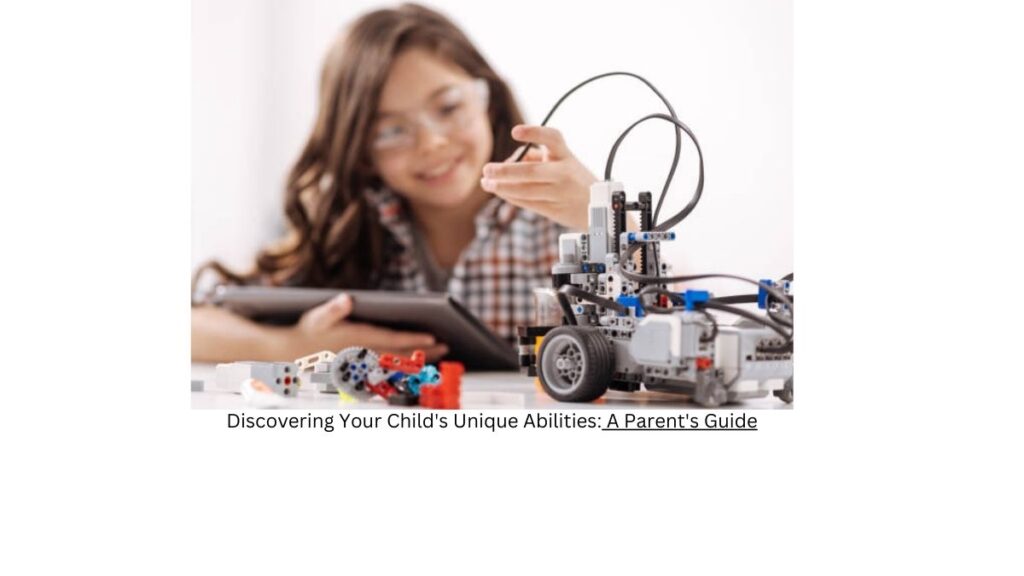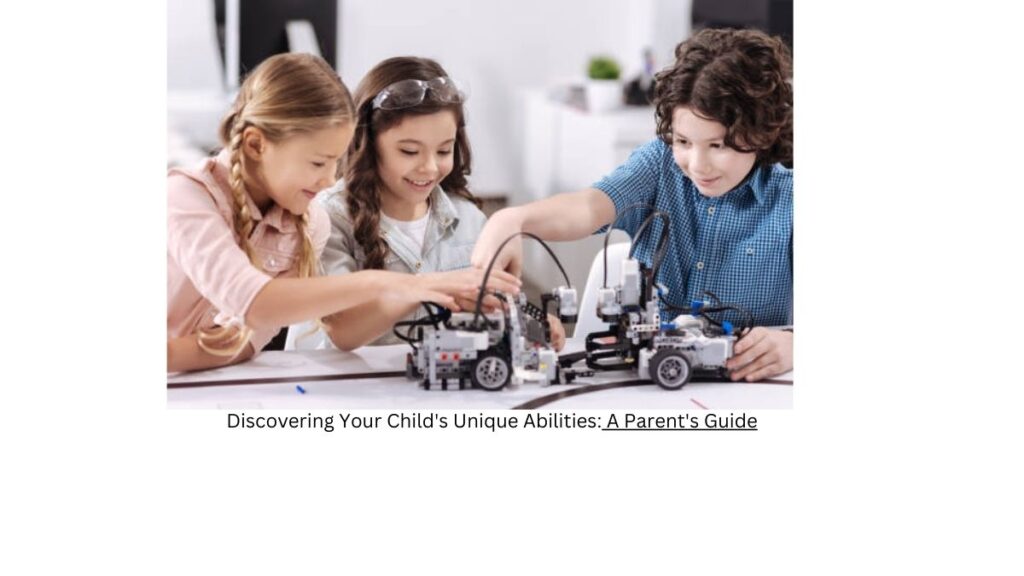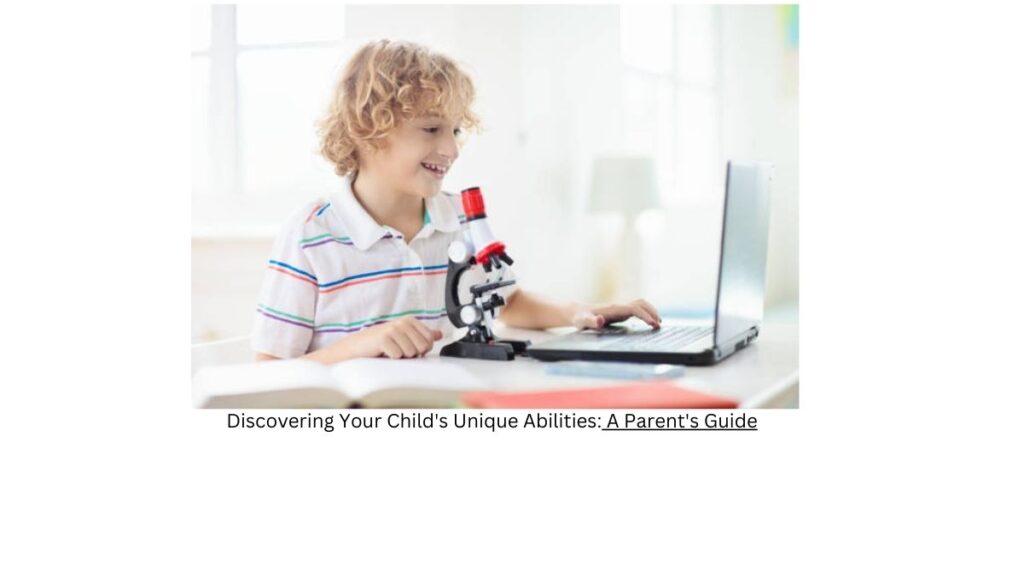Introduction–
Discovering Your Child’s Unique Abilities: A Parent’s Guide

Every child is born with a set of unique abilities and talents waiting to be discovered. As a parent, your role is not just to nurture your child’s growth but also to help them explore their individual strengths and interests. In this guide, we’ll discuss how you can embark on the journey of discovering your child’s unique abilities and support their development effectively.
How you can begin the journey of discovering your child’s unique abilities and effectively support their development.
1. Pay Close Attention

Observation is the first step in understanding your child’s talents. Pay close attention to their interests, hobbies, and the activities that captivate their attention. Do they enjoy drawing, solving puzzles, playing a musical instrument, or participating in sports? These early clues can reveal their innate talents.
2. Encourage Exploration
Allow your child to explore a wide range of activities and interests. Provide them with opportunities to try different things, from arts and crafts to sports and music. This exploration helps them discover what truly resonates with them and where their talents may lie.
3. Listen and Communicate
Open and effective communication with your child is crucial. Encourage them to express their thoughts and feelings about various activities. Listen to their experiences and ask questions that can help them reflect on what they enjoy and what they excel at.
4. Be Supportive, Not Pushy
While it’s important to support your child’s interests, avoid being too pushy or forcing them into activities they don’t enjoy. Offer guidance and encouragement, but let them take the lead in choosing their path. Talents are best nurtured when they come from a place of genuine interest.
5. Provide Learning Opportunities
Enroll your child in classes or programs related to their interests. Whether it’s art classes, music lessons, or sports teams, structured learning experiences can help them develop their skills and talents.
6. Celebrate Achievements
Acknowledge and celebrate your child’s achievements, no matter how small. Recognizing their efforts and successes boosts their confidence and motivation to continue honing their abilities.
7. Connect with Experts
If you notice exceptional talent in a specific area, consider connecting your child with experts or mentors in that field. Their guidance can provide valuable insights and opportunities for growth.
8. Foster a Growth Mindset
Teach your child the importance of effort and perseverance. A growth mindset emphasizes that skills and abilities can be developed through dedication and hard work. This mindset can motivate them to continuously improve their talents.
9. Create a Supportive Environment
Design an environment that encourages exploration and learning. Stock your home with books, art supplies, and musical instruments to spark creativity and curiosity.
Remember that discovering and nurturing your child’s talents is a process that takes time. Be patient and flexible, as their interests may evolve over time. What they’re passionate about at a young age may change as they grow.
How do you acknowledge support and encourage children’s uniqueness and efforts in a positive way?
Acknowledging, supporting, and encouraging a child’s uniqueness and efforts in a positive way involves a combination of actions:

- Active Listening: Take the time to listen attentively to the child’s thoughts, ideas, and feelings. This shows that their perspective is valued.
- Positive Reinforcement: Recognize and praise their efforts and achievements. Be specific in your feedback to highlight what they did well.
- Celebrate Differences: Embrace and celebrate the child’s unique qualities, talents, and interests. Help them see the beauty in diversity.
- Encourage Curiosity: Foster a sense of curiosity by encouraging questions and exploration. This helps them discover their own interests and strengths.
- Provide Opportunities: Create an environment that allows the child to explore different activities and find what they enjoy. This helps them develop a sense of identity.
- Set Realistic Goals: Help the child set achievable goals and guide them in working towards those goals. Celebrate milestones along the way.
- Be Patient and Supportive: Understand that each child develops at their own pace. Provide the support and encouragement they need without putting unnecessary pressure on them.
- Model Positive Behavior: Demonstrate positive behavior and attitudes, as children often learn by example. Show them the importance of kindness, empathy, and resilience.
- Create a Safe Space: Foster an environment where the child feels safe to express themselves without fear of judgment. This promotes open communication and self-expression.
- Encourage Problem-Solving: Teach the child problem-solving skills and resilience. This empowers them to overcome challenges and learn from their experiences.
Remember, the key is to be consistently positive, supportive, and attentive to the individual needs and strengths of each child.
What are strengths or skills in kids?
Children can exhibit a wide range of strengths and skills, both in cognitive and socio-emotional domains. Some common strengths and skills in kids include:

- Curiosity: Children are naturally curious, eager to explore and learn about the world around them.
- Creativity: Many kids have a vivid imagination and enjoy expressing themselves through various creative outlets, such as art, storytelling, or play.
- Resilience: Children often demonstrate resilience in bouncing back from challenges, setbacks, or failures.
- Empathy: Developing empathy allows children to understand and share the feelings of others, promoting positive social interactions.
- Communication: The ability to express thoughts and feelings verbally and non-verbally is a crucial skill for children to develop positive relationships.
- Problem-solving: Children can exhibit problem-solving skills as they navigate challenges and find solutions, promoting critical thinking.
- Cooperation: Learning to work with others, share, and take turns are essential social skills that contribute to positive interactions.
- Adaptability: Children are often adaptable, adjusting to new situations and environments with relative ease.
- Motor Skills: Both fine and gross motor skills develop in children, including abilities like hand-eye coordination, balance, and control over movements.
- Independence: As children grow, they often develop a sense of independence and a desire to do things on their own.
- Curiosity: Children have a natural curiosity that drives them to explore and learn about the world.
It’s important to recognize and nurture these strengths and skills, providing opportunities for children to further develop and refine them as they grow. Additionally, each child is unique, so they may demonstrate a combination of these strengths in varying degrees.
In conclusion,
every child has unique abilities waiting to be uncovered. As a parent, your role is to be a supportive and attentive guide on their journey of self-discovery. By paying attention, encouraging exploration, and providing opportunities for growth, you can help your child realize their full potential and lead a fulfilling life guided by their unique talents.





